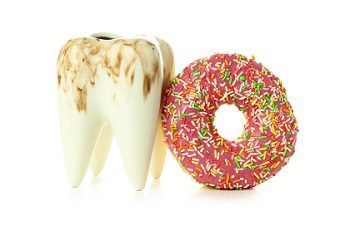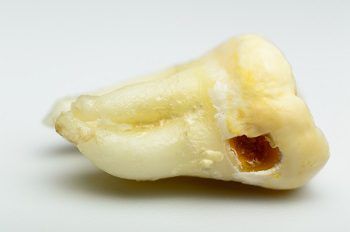How do I know if I have tooth cavities?
Your overall health greatly depends on the condition of your teeth. One of the most crucial strategies to maintain teeth health and avoid other problems is to prevent tooth cavities.
According to the Centers for Disease Control and Prevention, nearly 30% of American adults have untreated dental cavities.
Untreated cavities can ruin your teeth and possibly lead to more severe problems. Therefore, it is beneficial to be aware of a tooth cavity's symptoms and contact your dentist as soon as you suspect one.
What is a tooth cavity?
Plaque can form on your teeth due to food and bacterial collection. The bacteria in plaque can destroy the enamel on the surface of your teeth by producing acids. Plaque can continue to eat away at your teeth and cause cavities if allowed to collect.
As a result, your tooth develops a hole due to a cavity. A cavity might eventually lead to tooth loss if not treated. A tooth abscess or an infection that enters your bloodstream, which poses a significant risk to your life, can develop from an untreated cavity. However, regular tooth brushing and flossing might aid in removing the sticky plaque.
Plaque may form more quickly in some parts of your mouth, such as:
- The chewing surfaces of your molars are where food particles can collect in the spaces.
- Between your teeth
- At the base of your teeth, close to your gums.

Eating foods that stick to your teeth frequently may make you more likely to get cavities. These foods include:
- Ice cream
- Dried fruit
- Candy
- Soda
- Fruit juice
- Foods high in sugar, like cake, cookies, and gummy candies
Children are more likely to get cavities, but adults are also at risk, especially when the gums begin to recede and reveal the tooth roots to plaque.
Possible signs of cavities
There are several indicators that a cavity may be developing. Additionally, there are a few warning signs that an existing cavity is expanding. Here are a few typical indications that show you could have a cavity.
Sensitive teeth
Persistent sensitivity after eating hot or cold food can cause tooth cavities.
The dentin, the hard tissue layer beneath the enamel, can be affected when the enamel on your tooth begins to deteriorate. Foods that are hot, cold, sticky, or acidic trigger the cells and nerves inside your tooth when there isn't enough enamel to protect the dentin. The sensitivity you experience results from this.
Although the most typical sensitivities associated with cavities are from heat and cold, Dr. Inna Chern, DDS, founder of New York General Dentistry, states that:
"The dental cavity can also cause persistent sensitivity to sweets and sugary beverages."
A persistent ache from sweets is often caused by enamel erosion and can be the beginning of a cavity, like temperature sensitivity.
Toothache
Persistent toothache in one or more teeth can indicate a tooth cavity. One of the most prevalent signs of a cavity is pain. This involves soreness and pain in or near your mouth. Moreover, this pain can occasionally strike out of nowhere or due to some food. Additionally, you might experience pressure and pain when biting into food.
Tooth staining
Cavity-related stains can be brown, black, or white and often occur on the tooth's surface. Your tooth's stains may initially look like white dots. The discoloration could get darker as the tooth decay progresses.
A hole in your teeth

The white spot on your tooth represents the beginning of a cavity. If it intensifies, you may see a hole or pit in your tooth when you look in the mirror or feel it when you run your tongue over the surface of your teeth. Some holes, particularly between your teeth, can't be touched or seen. However, you can still experience discomfort or sensitivity near the cavity.
Therefore, make an appointment to see your dentist if you find a hole or pit in your tooth.
Things you can do to prevent cavities
Maintaining adequate oral hygiene is the first defense in the battle against cavities. The following are some of the things you can do against cavities and other more severe tooth decay problems:
- Visit your dentist for routine professional cleanings and exams every six months.
- Use fluoride-containing toothpaste to brush your teeth at least twice every day.
- Create regular oral hygiene practice that includes using floss or a water flosser to clean in between your teeth.
- Drink water all day to help you brush your teeth and increase saliva production—your chance of developing cavities increases if you have a dry mouth.
- Try to limit your intake of sugary foods and avoid regularly sipping on sweetened juices or drinks.
When to see a dentist?
It is better to make an appointment with your dentist to evaluate the region if you experience constant temperature or sweet sensitivity, especially if the problem persists for more than 24 to 48 hours (about 2 days).
Another reason to visit the dentist is if you have a toothache that won't go away or stains on your teeth. One of the best methods to avoid or stop existing cavities from developing into worse problems, like a root canal, is to visit the dentist frequently every six months and obtain regular X-rays.
Conclusion
Small cavities can lead to tooth decay and other severe issues if they are allowed to get larger.
Do not hesitate to notify your dentist if you have any tooth sensitivity, pain, discomfort, discoloration, or holes in your teeth. The sooner you evaluate a cavity; the more successful and minimally intrusive the treatment will likely be.
Contact your Danville dentist, Dr. Hoss Abar, DDS, MSD at Danville Orthodontics, to learn about tooth cavities.
Resource:
Deep Dental Cleaning Procedure
This media/content or any other on this website does not prescribe, recommend, or prevent any treatment or procedure. Therefore, we highly recommend that you get the advice of a qualified dentist or other medical practitioners regarding your specific dental condition.
